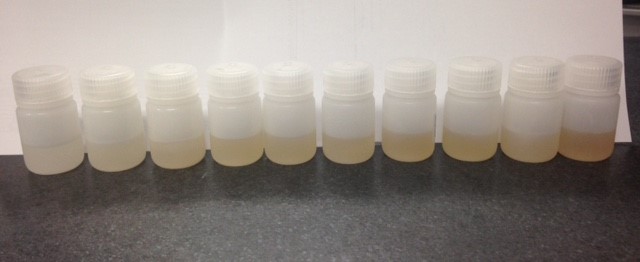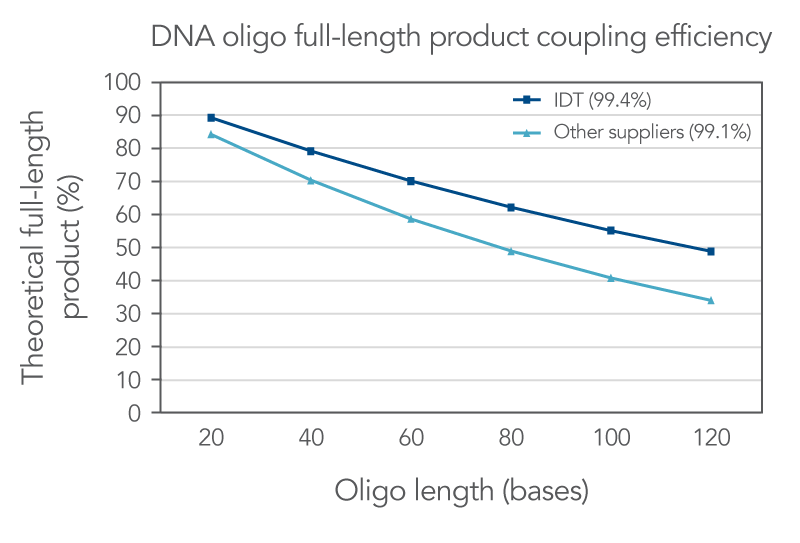Rapid HPLC™ DNA Oligos
HPLC purified oligos offer speed without comprising the quality of your oligos. Each Rapid HPLC DNA Oligo is quality controlled by electrospray ionization mass spectrometry and capillary electrophoresis or analytical HPLC.
Ordering
Rapid HPLC Oligos
Delivered dry in tubes. To meet the ordering deadline, orders for Rapid HPLC Oligos must be placed online.
The Rapid HPLC fee for expedited HPLC purification will be applied for each oligo.
Product Details
HPLC purification
High performance liquid chromatography (HPLC) purification, a form of column chromatography, can be performed in one of two ways. Reverse-phase (RP) HPLC separates oligos based on their affinity for particular solvents, while ion-exchange (IE) HPLC separates oligonucleotides based on their charge. The type of HPLC we use is dependent on the sequence and molecular characteristics of the oligo. HPLC-purified oligos experience an unavoidable loss of mass, but this is offset by the dramatic increase in purity. To learn more about our purification services, click here.
Rapid HPLC Oligos are purified using the same equipment and protocols as standard HPLC purification. All oligos are quality control checked by electrospray ionization mass spectrometry (ESI-MS), with traces available for free on our website. If you place your order before the day's deadline (below), your Rapid HPLC Oligos will be shipped on the next business day.
Specifications
- 10–60 bases; available with 5′ Phosphorylation or 5′ Amino Modifier C6
- Each oligo is quality controlled with ESI-MS
- Shipped dry in tubes
- Available in the US and Canada
Ordering deadlines
Available in US and Canada only.
Order online by 3:00 pm ET.
Product Data
IDT's long-standing reputation as a leader and pioneer in custom oligo manufacturing is largely due to our vertically integrated proprietary synthesis platforms. Nearly every component of our process is designed and developed in-house, including specialized synthesizers that can accommodate the most demanding oligo requests, and high-throughput automation systems that ensure fast turnaround times. Our commitment to quality and consistency results in a reliable product that helps provide confidence in your research. An important measure of quality for any oligo manufacturer is coupling efficiency, as this directly affects the amount of full-length product you receive. Our manufacturing methods allow us to achieve high coupling efficiencies (Figure 1).
Figure 1. IDT proprietary platforms have a better coupling efficiency than other suppliers, which provides more full-length oligonucleotides in your order. Small increases in coupling efficiency (≤1%) result in measurable increases in full-length product yield. The curves represent the theoretical yield for different lengths of oligos based on a coupling efficiency of 99.4% (IDT oligos, n = 126) and 99.1% (other suppliers, n = 134 from three different suppliers) using the following formula: percent full length product = (eff)(n-1)*100 where eff = coupling efficiency (for example, 99.4% = 0.994) and (n–1) is the number of coupling reactions needed to make an oligo of length n.
Resources
Frequently asked questions
Why should I consider purification of my oligos?
Purification removes truncated products and other synthesis impurities. Our experience has shown that purifying an oligonucleotide that will be used in demanding applications saves both time and money in the long run. We recommend considering additional purification for any oligonucleotide that will be used for an application other than routine PCR, qPCR, or Sanger DNA sequencing.
As a general rule, IDT also recommends that any oligonucleotide longer than 40 bases should receive further purification. For questions, please contact us.
Why are my oligos a yellow/brown color?
Customers who are new to working with large amounts of material are sometimes surprised when they see a yellow or brown discoloration to their oligos. If you have experienced this, do not worry. Color variation is normal in custom synthesis, especially as concentration increases. Importantly, IDT does not expect this to affect oligo function in our customers' experimental applications.

The image above depicts normal color variation as seen in oligo pools which are formulated to the same concentration (200 nmol oligos in 15 mL solution). In general, modified oligos at larger scales are more likely to display the variation seen above, while small-scale unmodified oligos (e.g., 25 nmol) tend to remain colorless in solution.
What is the sodium salt exchange that is done after HPLC purification?
The sodium salt exchange we perform post-HPLC purification is a sodium acetate precipitation. It helps remove any remaining TEAA in the oligo preparation after HPLC purification.
It is important to make sure oligos used in in vivo assays are TEAA-free because it can be toxic to cells.
What is the difference between scale and yield and why don’t I receive that full amount designated by the scale I order?
Oligo synthesis is accomplished through a series of steps, including coupling of individual bases, cleaving the oligo from the solid support, desalting, and if requested, purification of the oligo by HPLC or PAGE. No chemical reaction occurs with 100% efficiency, and, thus, each of these steps will incur a loss of final yield, which varies from specific sequence synthesis to synthesis.
Due to this variation, IDT custom oligos are ordered according to the amount of starting material used for the synthesis, referred to as the scale. While we cannot predict the actual final yield, we do guarantee a specific minimum yield for each oligo based on its sequence, starting scale, and the typical yield obtained under those specified conditions.
If you would like to know the minimum guaranteed yield for a specific oligo, simply add it to your Shopping Cart. The Shopping Cart provides you with the guaranteed minimum yield. If it is insufficient or excessive for your needs, simply edit the scale.
Please contact us if you have any questions about the yield you have received.
What are the length restrictions for your DNA oligos?
Standard DNA oligos are synthesized up to 100 bases, while our high fidelity Ultramer™ Oligonucleotides can provide single-stranded DNA up to 200 bases.
Beyond 200 bases, we offer our new gBlocks™ Gene Fragments which are double-stranded DNA constructs available from 126 bp up to 2000 bp.
I received my oligo shipment, and it is marked PARTIAL. What does that mean?
Partial shipping means that we are shipping the oligos you ordered to you as they are completed, rather than our default method of waiting to ship until the entire order is complete, with all of the oligos shipping at the same time. We make every effort to synthesize and ship your oligos as quickly as possible because we know that they are time sensitive.
On occasion, one or more oligos may become delayed, e.g., because they did not pass one of our quality control checks or their processing took longer than anticipated. In these cases, we can ship you a partial order at your request. You can also choose to have your order ship partial if you know some of your oligos will take longer than others (because of purification, etc.)—such requests will incur an extra shipping charge.
If you would like to set an order to ship partial, you can request it at the time of checkout or contact us.
How do I determine the Tm of my sequence?
IDT offers a free online calculator, the OligoAnalyzer™ Tool, that will determine the Tm of your oligonucleotide sequence for reaction conditions you specify.
Be sure to include the Mg2+ and dNTP concentrations you plan to use in your reaction, as this will affect the Tm for your oligo.
For what applications is it ok to use standard, unmodified desalted oligos?
Standard desalted oligos can be used in routine PCR, qPCR, and DNA sequencing applications.
Through improvements to the traditional phosphoramidite chemistry and advances in instrumentation, IDT has obtained a coupling efficiency that allows standard desalt oligos to work well for these applications.
Do you do post synthesis sequence analysis of oligos?
The products we perform post-synthesis sequencing on are the double-stranded gBlocks™ Gene Fragments, and the Gene and Mini Gene™ synthetic genes.
Can I anneal my DNA oligos at room temperature and if so, what buffer should I use?
Although it may be possible to anneal oligos at room temperature, heating to denature the oligos and then cooling slowly to anneal the two oligos will help to ensure more efficient annealing and favor the stable duplex formation.
If you choose not to heat the oligos, it would be prudent to carefully screen the oligos for secondary structures which could interfere with the annealing reaction.
More information on how to anneal oligos can be found in the Annealing Oligos DECODED™ article.
Are there deletion products in a standard desalt preparation of an oligo?
Though the majority of product will be the desired sequence, standard desalt oligos will contain a heterogeneous population of sequences, and this heterogeneity will increase with increasing length of the oligo. Oligos are synthesized 3'->5', base by base, through a series of chemical reactions. Chemical reactions are rarely, if ever, 100% efficient; the coupling reaction itself is approximately 99.6% efficient. With each base addition, less than 1% of the growing oligonucleotide chains will not undergo base extension.
After base coupling, we perform a capping step to prevent any truncated molecules from participating in further base addition. Because the capping reaction is slightly less than 100% efficient, a very small percentage of the truncated mutants will remain uncapped and can react during subsequent couplings steps. This leads to the formation of deletion mutants. The resulting oligonucleotide preparation, while comprised mostly of the ordered sequence, is a mixture of the full length oligos, truncated sequences, and sequences with internal deletions.
For exceptionally long oligos, such as our Ultramer™ Oligonucleotides and xGen™ Hyb Panels, IDT uses a proprietary IDT Ultramer synthesis process, which has been designed to give a high coupling efficiency (99.6%). This high coupling rate helps to allow us to synthesize long oligos (xGen Custom Hyb Panels are 60–120 bases long) with a high percentage of full-length product.
What are the ideal storage conditions for promoting long term oligo stability?
For long term oligo storage, temperature is the most important factor to consider. For long term storage, whether oligos are dried down, or
resuspended in non-DEPC treated water or TE buffer (10 mM Tris pH 8.0, 0.1 mM EDTA; such as IDTE),
we recommend that you store your oligos at –20°C.
For 4°C storage, oligos are stable for at least 60 weeks when stored dry, or resuspended in non-DEPC treated water or TE buffer (10 mM Tris pH 8.0, 0.1 mM EDTA; such as IDTE).
It is also important to note that for DNA oligos, an acidic pH can induce depurination, therefore maintaining a neutral pH is important. For RNA oligos a neutral pH is also important, as basic pH buffers can induce RNA breakdown.
Please see the DECODED, Storing oligos: 7 things you should know, for data on oligonucleotide storage and a more thorough explanation.
Are IDT oligos desalted (salt-free)?
The desalting process does remove the majority of these organic molecules, though trace amounts can still be present in a shipped oligo.
For the most demanding applications sensitive to even trace amounts of salts, e.g., NMR or crystallography, upon receipt we recommend dialyzing your oligos or using a size exclusion column as a clean-up step.
Are IDT oligos DNase and RNase free?
All of the custom DNA and RNA oligonucleotides that IDT offers are synthesized chemically, not enzymatically. As a result, there should not be DNase or RNase present.
It is worth noting that there are abundant nucleases present in most environments, so good laboratory practice is very important to minimize potential exposure. IDT also offers RNaseAlert® and DNaseAlert™ substrates to help identify nuclease degradation.

